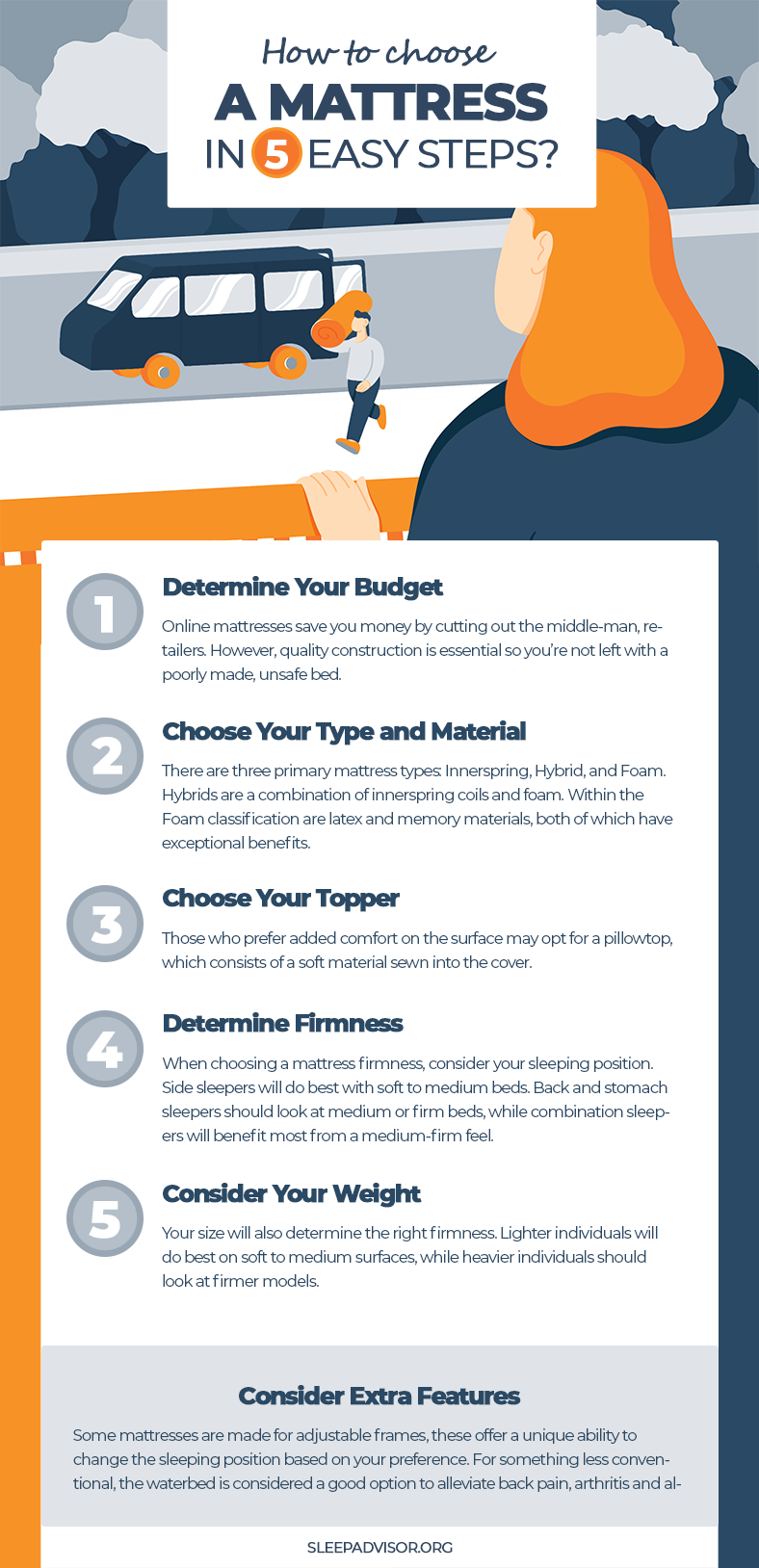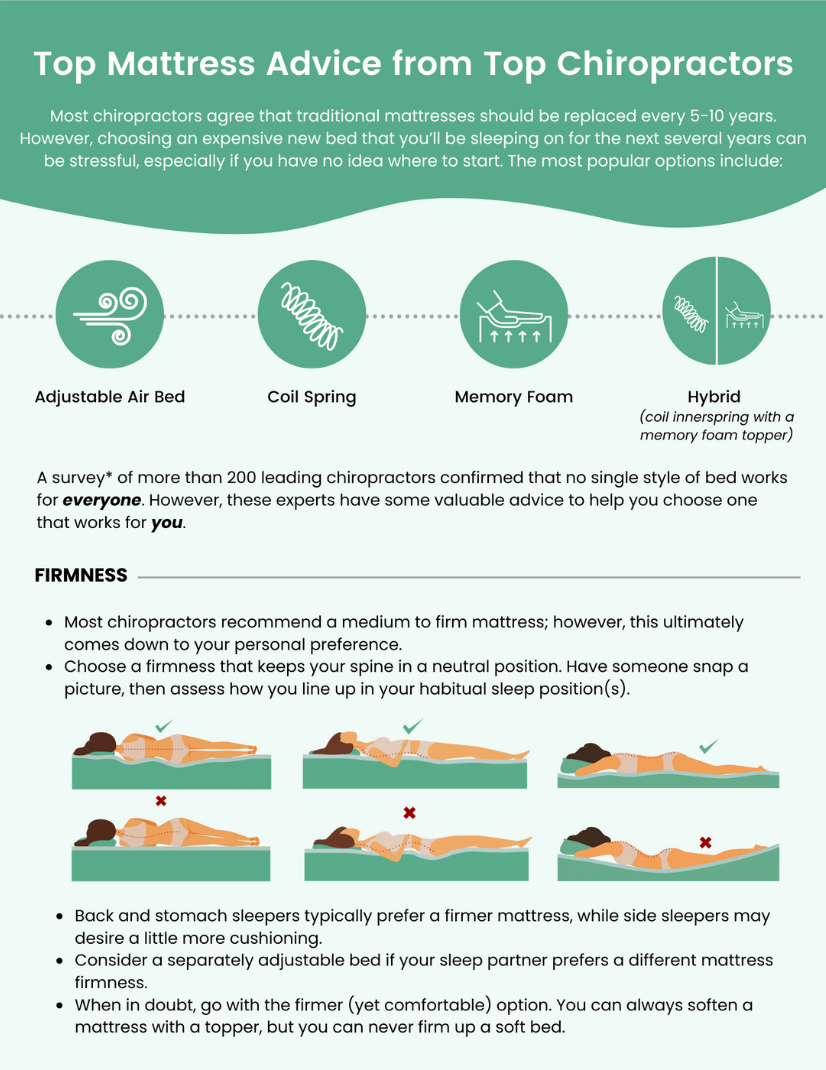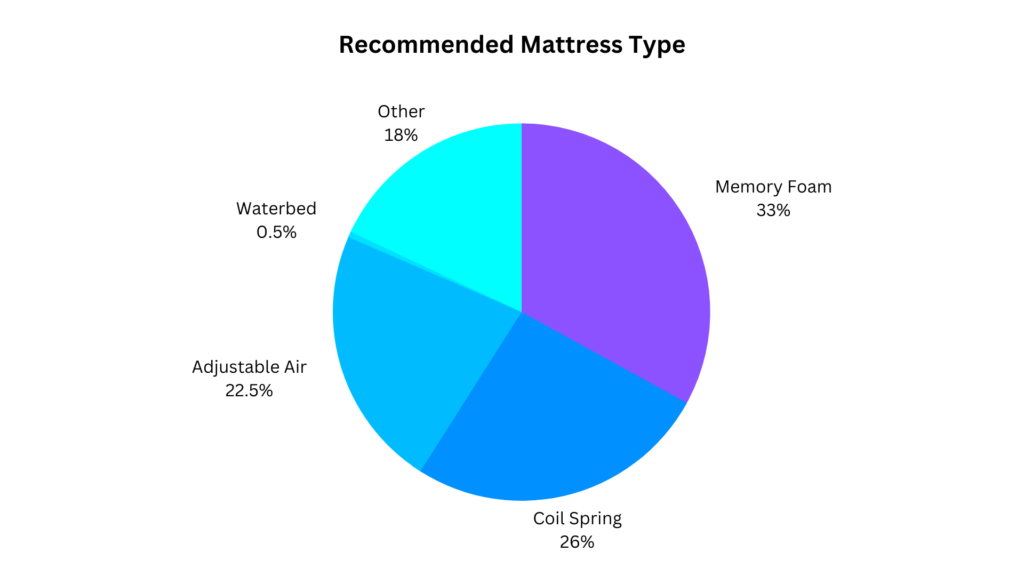Having trouble getting a good night’s sleep? If so, you may be wondering what mattresses do chiropractors recommend? Chiropractors have a unique perspective on sleep health and can provide great insight into what type of mattress is best for you. In this article, we’ll take a look at what chiropractors have to say about mattresses and how to unlock the secret to a good night’s sleep.
Benefits of a Good Night’s Sleep

1. Improved Mental Health: Getting the right amount of sleep helps to improve your mental health. It helps to reduce stress levels, improve concentration, and increase alertness. It also helps to reduce the risk of developing depression and anxiety.
2. Improved Physical Health: A good night’s sleep can also be beneficial to your physical health. A good night’s sleep helps to boost your immune system, improve cardiovascular health, and reduce inflammation. It also helps to regulate hormones, which can help to improve metabolism and control appetite.
3. Increased Productivity: When you get enough sleep, you’re able to focus more and be more productive. With enough sleep, you’re able to think more clearly and make better decisions.
4. Improved Memory: Getting enough sleep helps to improve memory and recall. A good night’s sleep helps to consolidate memories and helps to improve memory recall.
5. Reduced Risk of Injury: When you’re well-rested, you’re less likely to get injured. A good night’s sleep helps to improve your coordination and reaction time, which can help to reduce the risk of injuries.
What Mattress Do Chiropractors Recommend?
Chiropractors recommend mattresses that provide adequate support and comfort, as well as help to alleviate pressure points and reduce pain. Memory foam mattresses are often recommended because they provide superior support and comfort, as well as help to reduce back pain. Innerspring mattresses are also a good option for those who want a mattress with more bounce and support.
Factors that Impact Sleep Quality

Diet
What you eat during the day affects your sleep quality. Foods that contain tryptophan, such as turkey, can help you relax and get ready for sleep. Avoid eating large meals and drinking too much fluid close to bedtime, as these can cause indigestion and disrupt your sleep.
Exercise
Regular exercise can help improve your sleep. Exercise increases your body temperature and can make you feel more alert, so try to avoid exercising close to bedtime. Aim to exercise for at least 30 minutes most days of the week.
Stress Levels
High levels of stress can have a negative impact on your sleep. Try to make time for relaxation or mindfulness activities such as yoga or meditation. Avoid activities that may stimulate your mind, such as playing video games or watching television late at night.
Mattress
A good mattress can help improve sleep quality. Chiropractors recommend mattresses that provide support and comfort. Look for mattresses with a medium-firm feel and good ventilation to help keep you cool during the night. Choose a mattress that is not too soft or too hard, as this can cause pain and disrupt your sleep.
What Mattresses Do Chiropractors Recommend?

Memory Foam
Memory foam mattresses provide excellent support for the spine and neck, as the foam moulds to the body’s shape, ensuring the spine is correctly aligned. The material is also known to reduce pressure points, helping to reduce aches and pains.
Latex
Latex mattresses are known for their ability to relieve pressure points and promote healthy spinal alignment. They are also hypoallergenic and breathable, regulating body temperature to ensure a comfortable sleep.
Hybrid Mattresses
Hybrid mattresses are a combination of innerspring coils and foam, providing a balance of support and comfort. They are designed to provide superior levels of comfort and help reduce aches and pains.
Innerspring
Innerspring mattresses are the traditional mattress choice, made from steel coils and layers of foam. Although they are not as supportive as other mattress types, they are great for those who enjoy a bouncier feel.
Adjustable Mattresses
Adjustable mattresses are ideal for those with chronic pain or need to adjust their sleeping position during the night. The mattresses can be positioned to provide the best support and comfort for the user.
Choosing the Right Mattress

- Firmness: Choosing the right mattress is essential for a good night’s sleep. Generally, chiropractors recommend a mattress that is firm enough to support the body and allow it to rest in its natural alignment. A mattress that is too soft can cause the spine and body to sink in, leading to pain and discomfort.
- Size: It is important to choose the right size mattress. A mattress that is too small can cause body discomfort and will not provide adequate support. A mattress that is too big may not fit in the bedroom or may cause sleepers to become lost in it, resulting in discomfort and even pain.
- Motion Transfer: It is important to consider motion transfer when choosing a mattress. Motion transfer is the amount of movement that is felt when one person moves on the mattress. A mattress with high motion transfer will cause the other person to feel their movements, which can be disruptive to sleep.
- Material: The material of the mattress is also an important factor to consider. Different materials provide different levels of comfort and support, and have different levels of motion transfer. Some materials, such as memory foam, are more supportive than others, while some are more breathable than others.
- Durability: It is important to choose a mattress that is durable and will last for many years. A mattress that is not durable may not provide adequate support over time, leading to discomfort and pain.
Common Mattress Mistakes to Avoid
- Buying a Mattress that is Too Soft or Too Hard: Chiropractors recommend a mattress that is neither too soft nor too hard. A mattress that is too soft does not provide adequate support to the spine, while a mattress that is too hard can cause pressure points and pain.
- Buying a Mattress That is Too Old: Older mattresses may not provide adequate support to the spine. If a mattress is more than seven to eight years old, it is time to replace it.
- Buying a Mattress Without Testing It Out: Before purchasing a mattress, it is important to test it out to ensure it is the right fit. Lie down in your normal sleeping position and see if the mattress fits your body shape and provides adequate support.
- Buying a Mattress Without Reading Reviews: It is important to read reviews from other customers to get an idea of the quality of the mattress. You should also consider the warranty when making a decision.
- Not Replacing Your Pillow: Pillows should be replaced every two to three years. An old pillow can cause neck and shoulder pain, as well as headaches.
- Buying a Mattress Without Considering Your Sleep Position: Different sleep positions require different support levels. Back sleepers need a firmer mattress while side sleepers need a softer mattress.
Frequently Asked Questions
What type of mattress is best for people with chronic back pain?
1. Latex Mattress: Latex mattresses provide superior support and are ideal for people with chronic back pain. They contour to the body and absorb motion, making them a good choice for couples. Latex mattresses are also naturally hypoallergenic and dust mite resistant.
2. Memory Foam Mattress: Memory foam mattresses are designed to provide superior pressure relief and support. They are ideal for people with chronic back pain because they mold to the body’s shape and reduce motion transfer. Memory foam mattresses are also known for their anti-microbial and dust mite resistant properties.
3. Hybrid Mattress: Hybrid mattresses combine memory foam layers with coils for superior support and pressure relief. They are ideal for people with chronic back pain because they provide the best of both worlds: softness and support.
4. Innerspring Mattress: Innerspring mattresses are the traditional type of mattress and provide excellent support. They are ideal for people with chronic back pain because they are firm, supportive, and durable.
5. Adjustable Beds: Adjustable beds are designed to be adjustable, so they can be adjusted to suit different sleeping positions. This makes them ideal for people with chronic back pain because they can be adjusted to provide support and comfort in any position.
Should I Buy a Mattress With a Firm or Soft Surface?
Chiropractors recommend finding a mattress that provides good support while still allowing the body to sink into it. Here are some tips to help you choose the best mattress for your needs:
- Consider Your Sleep Position:
-
- Side sleepers need a softer mattress that allows their hips to sink in and their shoulders to be supported. Back sleepers need a firmer mattress that keeps their spine in alignment. Stomach sleepers need a mattress that is neither too soft nor too firm in order to keep the spine in alignment.
- Test It Out: Before you buy a mattress, it is important to test it out. Spend at least 10-15 minutes testing the mattress in the store to make sure it is comfortable and supportive.
- Think About Your Weight: Heavier people will need a firmer mattress to provide the support they need. Lighter people may find that a softer mattress is more comfortable.
- Don’t Sacrifice Comfort For Support: It is important to find a mattress that provides both comfort and support.
Ultimately, the best mattress is the one that feels right to you. Make sure to take your time when shopping for a mattress, and don’t be afraid to try out different options before you make a decision.
Is it Better to Buy a Traditional Spring Mattress or a Hybrid Mattress?
Hybrid mattresses offer the best of both worlds, combining the support of innerspring coils with the comfort of foam. Hybrids typically have a layer of foam on top and a support system of coils beneath. The layers are designed to work together to provide support and cushioning. Hybrids also tend to be cooler than traditional spring mattresses due to their breathable foam layers. For this reason, they may be a better option for those who tend to sleep hot.
How Often Should I Replace My Mattress?
Chiropractors recommend replacing your mattress every 8-10 years, as it is the average lifespan of a quality mattress. However, the exact timing depends on how comfortable the mattress is, how much support it provides, and how often you use it. If your mattress is showing signs of wear, such as sagging or lumpiness, it may be time to replace it sooner.
What other factors should I consider when selecting a mattress?
Comfort: Ultimately, comfort should be the deciding factor when selecting a mattress. A mattress should be comfortable for both you and your partner. Take into account your body type and sleeping preferences. If you prefer a firmer mattress, look for those with higher coil counts or a latex core. If you prefer a softer mattress, look for models with memory foam or pillow top layers.
Price: Consider the price of the mattress. You don’t have to spend a lot to get a good mattress; however, you should understand that you get what you pay for. Higher quality mattresses tend to be more expensive but they also last longer and provide more comfort.
Durability: Look for mattresses with a longer warranty. A longer warranty means the manufacturer has confidence in their product. Also, look for mattresses with high-quality materials. High-quality materials last longer and provide better support.
Size: Make sure you buy a mattress that fits your bed frame. If you are buying a mattress for a king-sized bed, make sure you buy one that is clearly marked as king-sized.
Motion Transfer: If you or your partner move around a lot during the night, look for a mattress that has minimal motion transfer. Memory foam mattresses are usually the best choice for this. They are designed to absorb motion and reduce disturbances.
Conclusion
Chiropractors recommend mattresses that are comfortable and supportive, with medium-firmness and good motion isolation. Memory foam, latex, and hybrid mattresses are all good options, depending on individual preference. Additionally, it is important to avoid mattresses that are too stiff, too soft, or too old. With the right mattress, a good night’s sleep is well within reach.






